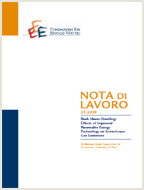Pollution Control with Uncertain Stock Dynamics: When, and How, to be Precautious

20.01.2011
Stergios Athanassoglou, Anastasios Xepapadeas
C61, D80, D81
Risk, Ambiguity, Robust Control, Precautionary Principle, Pollution Control
Climate Change and Sustainable Development
Carlo Carraro
The precautionary principle (PP) applied to environmental policy stipulates that, in the presence of uncertainty, society must take robust preventive action to guard against worst-case outcomes. It follows that the higher the degree of uncertainty, the more aggressive this preventive action should be. This normative maxim is explored in the case of a stylized dynamic model of pollution control with uncertain (in the Knightian sense) stock dynamics, using the robust control framework of Hansen and Sargent [12]. Optimal investment in damage control is found to be increasing in the degree of uncertainty, thus confirming the conventional PP wisdom. Optimal mitigation decisions, however, need not always comport with the PP. In particular, when damage-control investment is both sufficiently cheap and sensitive to changes in uncertainty, damage-control investment and mitigation may act as substitutes and a PP with respect to the latter can be unambiguously irrational. The theoretical results are consequently applied to a linear-quadratic model of climate change calibrated by Karp and Zhang [20]. The analysis suggests that a reversal of the PP with respect to mitigation, while theoretically possible, is very unlikely.
***
Suggested citation: Stergios Athanassoglou, Anastasios Xepapadeas, Pollution control with uncertain stock dynamics: When, and how, to be precautious, Journal of Environmental Economics and Management, Volume 63, Issue 3, May 2012, Pages 304-320, ISSN 0095-0696, http://dx.doi.org/10.1016/j.jeem.2011.11.001
